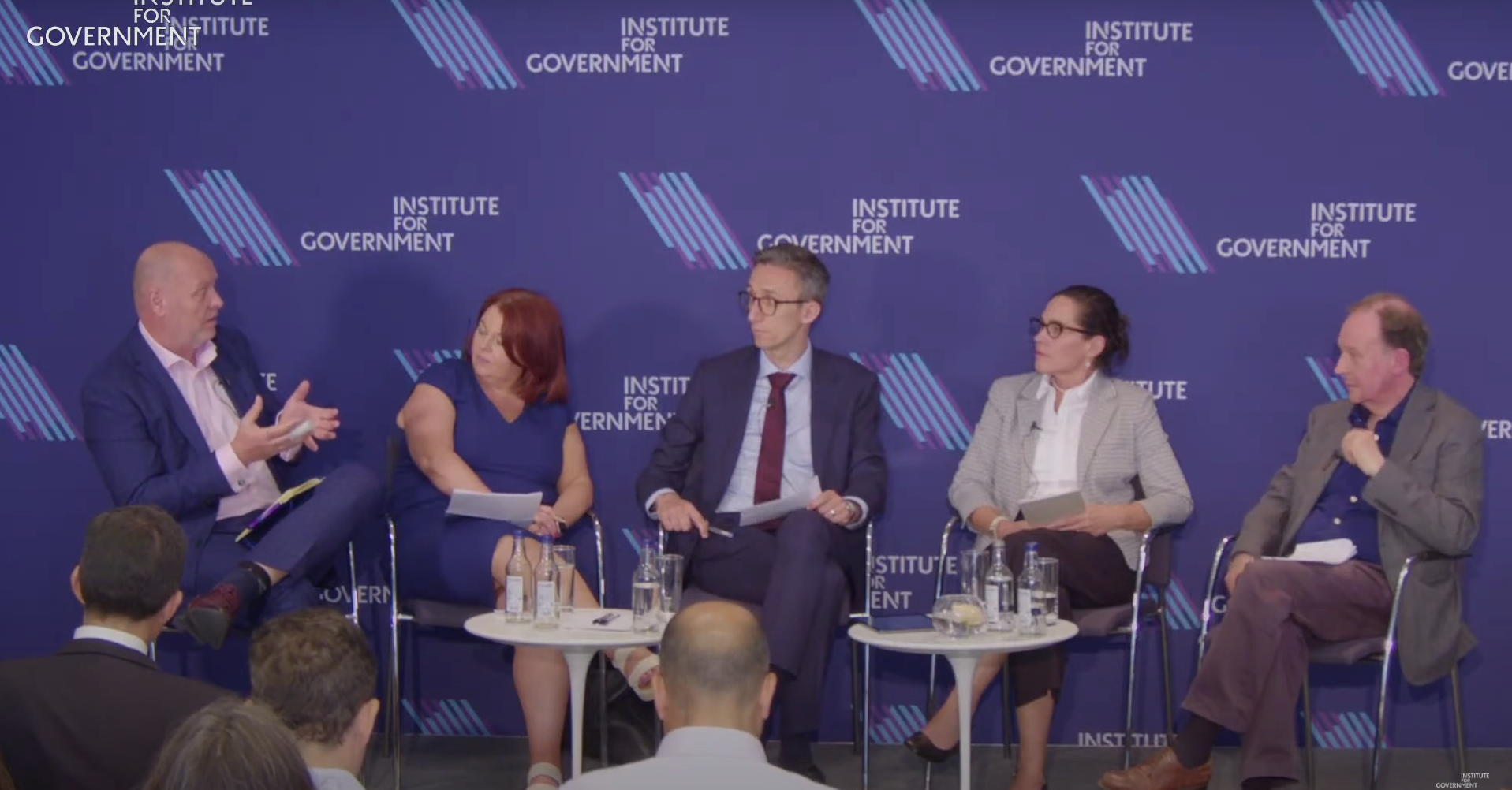Maths, Mum and Dad: Matt Ross talks to Jonathan Slater

When I ask people why they joined the civil service, many reply that they were inspired by parents who worked in public services. Jonathan Slater, who became Permanent Secretary at the Department for Education (DfE) in May 2016, is one of them: “My mother was a social worker and my father was a teacher, and I thought they were wonderful at what they did – helping the kids to achieve their best,” he recalls.
But here his story diverges from the commonplace; Slater was stronger in the sciences than the humanities. “I wanted to work in public service, but I knew I couldn’t do either of my parents’ jobs,” he says. “So I ended up doing maths at university, simply because that was what I was best at. I remember looking at a book called: ‘What do mathematicians do?’, and you could become an accountant or an auditor or an actuary. There were lots of jobs that started with ‘A’, that sounded boring and weren’t to do with public services – and then there was something called operational research.”
This, he learned, means “using maths to solve complex problems” in business processes and organisational structures. “Here was a way of combining what I was good at with something that was useful in the public sphere,” he explains. So Slater did an MSc, joined British Rail and embarked on a career in public sector change management. “I don’t think it was by design,” he adds. Nonetheless, Slater had found his vocation.
He worked for London councils, becoming director of education and deputy chief executive at Islington; then joined government as a director in the Prime Minister’s Delivery Unit. Six years at the National Offender Management Service and the Ministry of Justice followed; and when his MoJ colleague Ursula Brennan became Permanent Secretary at the Ministry of Defence, she brought Slater in to enact Lord Levene’s report on defence reform.
“Change – improving the way an organisation works – is also an expert’s task.”
“I wasn’t expert in justice policy or defence policy,” he recalls. “But change – improving the way an organisation works – is also an expert’s task.”
Thirty years after Slater took his first public sector change job, what’s he learned about making reforms stick? In answer, he recalls a 2016 visit to a special needs school in Darlington.
“I watched the head teacher give an absolutely inspiring assembly,” he says. “All the kids there had behavioural problems such that they couldn’t be in mainstream schools, but they were totally quiet and well-behaved; it was wonderful. So, I said to her afterwards: ‘How do you do that?’ And she said: ‘Relentless positivity’.

Top of DfE staff’s ‘broken’ list was, it seems, the performance management system: under the widely-criticised ‘forced distribution’ appraisal policy, introduced in April 2013 by then-Cabinet Office minister Francis Maude, managers had to grade 25% of their staff as performing well and 10% as failing.
“We won’t have forced ranking any more, that’s gone,” says Slater. And instead of holding annual appraisals, managers will now “have a monthly conversation with their staff – so people can change course along the way, rather than waiting until the end of the year,” he promises.
The system under which only the top 25% received a performance bonus is also being reformed. “That’s telling 75% of our staff that they’re not all that good, and that’s not relentlessly positive!” says Slater. Instead, the bonus pot will be distributed across the directorates, and “if someone does something impressive over and above their job, they’re entitled to a small financial reward. So we can respond immediately when somebody’s done something really well,” he adds.
Such changes are likely to boost an ongoing rise in departmental morale. The Civil Service People Survey shows that the headline employee engagement figure, which fell 12 points between 2009 and 2013, has now fully recovered. But the results for pay and benefits remain eight points below the 2009 position. Here, Slater has far fewer levers.
“I’ve heard examples of ministers saying, ‘Why didn’t they tell me what they thought?”
“In any walk of life, whatever the job is, you would want to give people the hope that they could improve their standard of living, and that would apply in the civil service as much as anywhere else,” he says carefully. “So the government has to balance its wish to reward people doing a good job, and to give them a sense of confidence about what’s coming down the track, against their responsibilities to the taxpayer. That’s a decision the government has to make.”
Slater’s focus on “relentless positivity” strikes a contrast with Maude’s approach to civil service reform, which often left civil servants feeling undermined and criticised. But he argues that Maude, who warned in September that “institutional complacency” and a “bias to inertia” are stalling the reform agenda, shouldn’t worry. To meet ministers’ goals, the department must “grow the commercial, digital, and customer focused skills that Francis Maude spoke about”, says Slater. “He needn’t fear: our ambition for making those changes has not diminished as a result of him no longer being minister for the Cabinet Office.”
Meanwhile, Slater is working to equip the Department for Education for its newfound role overseeing public service delivery. When Michael Gove became education secretary in 2010, there were just 200 academy schools – which report directly to the DfE, rather than to local education authorities. “But I’ve now got 7,000 academies reporting through 3,000 trusts,” Slater explains, and ministers and parliamentarians “expect the department to be able to account for their performance, the quality of their buildings, the number of teacher vacancies.”
Then there’s the need to offer 30 hours of free childcare to the parents of toddlers, and to create three million apprenticeships by 2020. “We’re now largely a delivery department, and that requires hard graft and real expertise,” he says. His latest change programme, launched late last year, is designed to “reflect that reality” – building the systems and teams required to monitor and manage frontline services.
This expansion of the DfE’s remit may worry those in the education sector who have long warned about its tendency to meddle endlessly in frontline delivery. Former DfE Permanent Secretary Sir David Bell, for example, argued during Gove’s tenure that “the system is being held back by teachers being subjected to constant, short-term policy and structural changes driven by the electoral cycle and political firefighting.”
Change is inevitable, responds Slater, and elected politicians must make the key decisions, but his collaborative, consultative approach to reform sounds very different from Gove’s head-down battle against the educational establishment he called ‘the Blob’.
“I take my daughter to school, and there’s no shortage of opportunities to keep it real,” says Slater. “So I recognise the concerns people have, and we’re always asking ourselves whether we’re being as helpful as possible to help them achieve their goals.”
Slater cites his department’s recent announcement on the next phase of primary school testing. Following “a comprehensive, genuine consultation process, I think it landed pretty well: people acknowledged that as we were bringing new things in, we were taking old things out, and that we had worked hard to build a consensus across the profession.”
It seems the relationship between ministers and civil servants has also come a long way since Gove’s tenure, when some apparently politicised appointments, the behaviour of his special advisers, and accusations of bullying prompted a flurry of leaks and senior departures. “I haven’t seen any civil servants acting in an inappropriately political way,” says Slater, adding that ministers consistently ask for honest advice – even if it runs against their political views.
“In my time as permanent secretary, I’ve never found a single example of a minister who objected to a civil servant advising them on something they chose not to do,” he explains. “I can imagine a scenario in which that would not be the case; I’m just telling you what it’s been like whilst I’ve been permanent secretary here. On the other hand, I’ve heard examples of a minister saying: ‘Why didn’t they tell me what they thought?’”
Slater points out that current Secretary of State Justine Greening is a former accountant – and says the two share an evidence-based, data-driven approach to assessing policy and reform ideas. “I’m instinctively interested in the costs and benefits of making a change, in quantifying and comparing them,” he says, adding that Greening tends to ask about the NPV: the ‘net present value’ of inflows and outflows.
“I’m not suggesting that’s universal: you don’t get that question from all Secretaries of State,” he adds. “But the fact that my political boss is just as interested in value for money as I am makes my task as accounting officer easier, and it’s a really good discipline.” Slater says his conversations with Greening tend to focus on three questions: “Number one, is this going to promote social mobility? Number two, is it going to work? And number three, what’s the NPV?”
This forensic approach to policymaking and organisational reform, Slater says, captures the hidden burdens of change as well as the cash costs: “If we announce a change to education policy, by definition there’s going to be a cost on the frontline: what is that cost, what’s the benefit, and how clear are we that one outweighs the other?”
Jonathan Slater seems to have found his sweet spot in the civil service: a place where, working with a like-minded Secretary of State, he can deliver evidence-based change in a field of service delivery about which he’s passionate. His approach to leading reform is, he says, “a combination of maths and parents”: it’s about applying his own strongest abilities to the “noble” vocations of his teacher father and social worker mother.
“Watching my parents do their jobs, I could see they were operating within a system in which there were constraints on what they did,” he recalls. Now, he runs the department which oversees both teachers and social workers – “amazing how life has come full circle”, he says – and has the opportunity to tackle those constraints. “The question for my department,” he concludes, “is how we’re helping them to do their jobs better – and then can I quantify it?”
Related News
-

FDA rejects claims civil service to blame for delays to Northern Ireland infrastructure projects
The FDA’s National Officer for Northern Ireland Robert Murtagh has spoken out against claims that the Northern Ireland Civil Service, were to blame for the failure of infrastructure projects to be completed on time.
-

Penman joins panel discussion on ethical leadership in government at IfG ‘Nolan Principles at 30’ conference
FDA General Secretary Dave Penman took part in a panel discussion covering the question ‘How can politicians demonstrate ethical leadership?’.
-

Carers Week 2025 – launching our Carers’ Survey
To mark Carers Week 2025 (9-15 June), the FDA is launching a survey of carers in the civil service to find out what progress has been made since our 2021 report, and what still needs to be done.